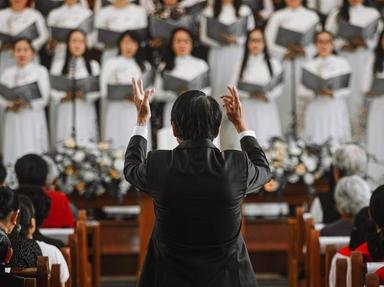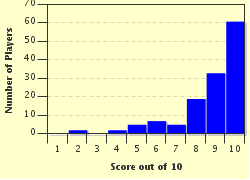Quiz Answer Key and Fun Facts
1. 'A Mighty Fortress Is Our God' was sung at the funeral of a man who was the Supreme Commander of the Allied Forces in Europe during the Second World War before becoming president of the United States, serving from 1953 to 1961. Who was the man?
2. 'How Firm a Foundation' was sung at the funeral of Robert E. Lee, commander of the Confederate Army of Northern Virginia in the U.S. Civil War. In what year was Lee's funeral?
3. 'Softly and Tenderly Jesus is Calling' was sung at the funeral of a noted American civil rights leader and Nobel Prize winner at Ebenezer Baptist Church in Atlanta, Georgia, on April 8, 1968. Who was the civil rights leader?
4. 'Abide with Me' was sung at the funeral of an Albanian born woman who won a Nobel Peace Prize and global acclaim for her efforts to help the impoverished people of Calcutta, India. Who was the woman?
5. 'Battle Hymn of the Republic', also known as 'Mine Eyes Have Seen the Glory' outside the United States, was sung at the funeral of a statesman known as the British Bulldog and at the funeral of an assassinated U.S. presidential candidate in 1968. Who are the two people?
6. 'Safe In the Arms of Jesus' was sung on August 8, 1885, when a U.S. president was laid to rest in Riverside Park, on the banks of the Hudson River. Who was the president?
7. 'Hark! From the Tombs a Doleful Sound' was sung at the funeral of George Washington, first president of the United States. In what year did Washington's funeral take place?
8. 'Master, the Tempest is Raging' was sung at the funeral of American president James Garfield after he was was assassinated. In what year was the funeral?
9. 'Peace, Troubled Soul' was sung by a 250-member choir on May 4, 1865, at the State House in Springfield, Illinois, as the the body of assassinated American president lay in state. Who was the president?
10. 'Sing With All the Saints in Glory' was sung at the funeral of an American president who was known as 'The Gipper'. Who was the president?
Source: Author
Cowrofl
This quiz was reviewed by FunTrivia editor
agony before going online.
Any errors found in FunTrivia content are routinely corrected through our feedback system.

